
The Ulidiidae or picture-winged flies are a large and diverse cosmopolitan family of flies (Diptera), and as in related families, most species are herbivorous or detritivorous. They are often known as picture-winged flies, along with members of other families in the superfamily Tephritoidea that have patterns of bands or spots on the wings. Some species share with the Tephritidae an unusual elongated posteroapical projection of the anal cell in the wing, but can be differentiated by the smoothly curving subcostal vein. Two species, Tetanops myopaeformis and Euxesta stigmatias, are agricultural pests.
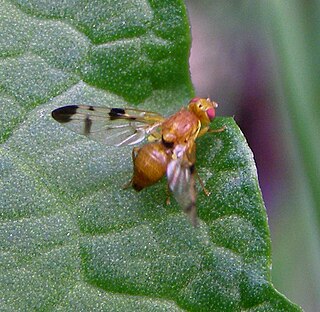
Trypeta is a genus of tephritid, or fruit flies in the family Tephritidae.
Euxesta abana is a species of ulidiid or picture-winged fly in the genus Euxesta of the family Ulidiidae. It was described by Charles Howard Curran in 1935. The species can be found at White Sands National Park in Tularosa Basin, New Mexico.

Euxesta anna is a species of ulidiid or picture-winged fly in the genus Euxesta of the family Ulidiidae.
Euxesta basalis is a species of ulidiid or picture-winged fly in the genus Euxesta of the family Ulidiidae. It was described by Francis Walker in 1853.
Euxesta contorta is a species of ulidiid or picture-winged fly in the genus Euxesta of the family Ulidiidae. It was described by Charles Howard Curran in 1935.
Euxesta eluta is a species of ulidiid or picture-winged fly in the genus Euxesta of the family Ulidiidae. It was described by Hermann Loew in 1868. It feeds on sweet corn in Santa Fe, Argentina. The species breed from spring to late fall by depositing their eggs in protected corn maizes.
Euxesta minor is a species of ulidiid or picture-winged fly in the genus Euxesta of the family Ulidiidae. It was described by Ezra Townsend Cresson in 1906.
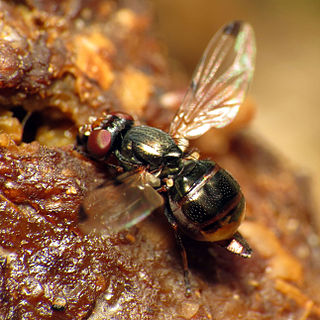
Euxesta is a genus of picture-winged flies in the family Ulidiidae.
Euxesta bicolor is a species of ulidiid or picture-winged fly in the genus Euxesta of the family Tephritidae. It was described by Ezra Townsend Cresson in 1906.
Euxesta fulvicornis is a species of ulidiid or picture-winged fly in the genus Euxesta of the family Tephritidae. It was described by Jacques-Marie-Frangile Bigot in 1886.
Euxesta nigricans is a species of ulidiid or picture-winged fly in the genus Euxesta of the family Ulidiidae. It was described by Frederik Maurits van der Wulp in 1899. It can be found in Guerrero, Mexico.
Euxesta willistoni is a species of ulidiid or picture-winged fly in the genus Euxesta of the family Ulidiidae. It was described by Daniel William Coquillett in 1900.
Euxesta xeres is a species of ulidiid or picture-winged fly in the genus Euxesta of the family Ulidiidae. It was described by Charles Howard Curran in 1935. The species can be found at White Sands National Park in Tularosa Basin, New Mexico.
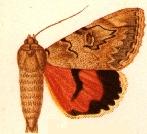
Catocala juncta is a moth of the family Erebidae first described by Staudinger in 1889. It is found in Xinjiang, China.

The Ulidiinae are a subfamily of flies in the family Ulidiidae. Like the Otitinae, most species are herbivorous or saprophagous. Most species share with the Tephritidae an unusual elongated projection of the anal cell in the wing, but can be differentiated by the smoothly curving subcostal vein. Most are dull gray to shiny brown or black flies with vein R1 setulose or, in a few cases, bare.
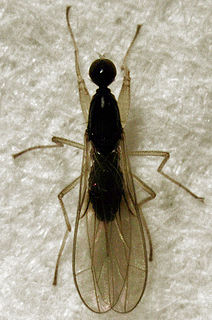
Hemerodromiinae are a worldwide group of predatory flies with raptorial forelegs.
Ortalis is an historic genus of Ulidiid or picture-winged flies, first described by Fallén in 1810. It served as the type genus for the family Ulidiidae, which was called Ortalidae at the time. In 1932, it was pointed out by Adlrich that the name Ortalis was preoccupied by a genus of birds which had been named by Merrem in 1786. The name of the fly family was therefore revised, with some authors calling it Otitidae until Ulidiidae was settled on as standard. The genus itself was found to be paraphyletic, and all of its species have been reassigned to other genera, some in the Ulidiidae, and some in other Tephritoid families. In the following list, the species are organized according to the families and genera to which they have been reassigned.
Ospriocerus is a genus of robber flies. There are about 17 described species in Ospriocerus.
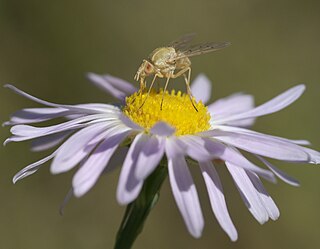
Poecilognathus is a genus of bee flies. There are at least 20 described species in Poecilognathus.






